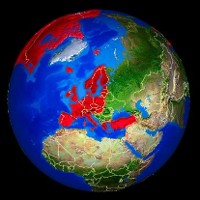24 March 2021 - 25 March 2021
Virtual meeting
OECD-IIASA Strategic Partnership: Fourth Task Force meeting
High-level delegations from the OECD and IIASA, led by Ángel Gurría, OECD Secretary-General, and Albert van Jaarsveld, IIASA Director General and CEO, will gather virtually on 24-25 March 2021 for the Fourth OECD-IIASA Task Force meeting. They will review progress achieved since the Third Task Force meeting hosted by the OECD in Paris on 26-27 February 2020 and will outline further steps on how to move this important collaboration forward. Government representatives of OECD member countries and the European Commission will attend the event and provide their feedback on priority activities for the OECD-IIASA strategic partnership.
The meeting will focus on systems-based strategies for recovery and longer-term sustainability, policy integration to manage connected systemic challenges, institutional frameworks for an integrated approach to sustainability, and other issues.
A number of presentations by OECD and IIASA representatives and invited participants are expected, including presentations by van Jaarsveld on “Science, innovation, and education for a just transition to a sustainable world economy” and by Leena Srivastava, IIASA Deputy Director General for Science, on “Transformations within reach: pathways to a sustainable and resilient world” in which she will outline the results and recommendations generated by IIASA and the International Science Council (ISC) Consultative Science Platform.
Other presentations include:
- A just transition to manage emerging systemic crises as defined by science and evidence (by Martin Lees, OECD-IIASA Task Force Chair)
- Economic foundations of the case for policy integration (by Michael Kuhn, Economic Frontiers Program Director, IIASA)
- Enhancing Governance for Sustainability and Resilience: Learning from the COVID-19 crisis (by Reinhard Mechler, Leader, Systemic Risk and Resilience Research Group, Advancing Systems Analysis Program, IIASA)
- Low carbon transition strategies for sustainable growth and wellbeing (by Alain de Serres, Deputy Director, Policy Studies Branch, Department of Economics, OECD)
- Mainstreaming systems thinking into development co-operation policy reform (by Ana Fernandes, Head of the Foresight, Outreach, and Policy Reform Unit, and Sidney Leclercq, Policy Analyst, Team Lead on Policy Reform for Development Cooperation, Foresight and Outreach, Development Co-operation Directorate, OECD)
- Mission-driven Policies for Sustainable Industry in the Dutch Climate Agreement (by Sander Kes, Senior Policy Advisor, Directorate-General, Enterprise and Innovation, Ministry of Economic Affairs and Climate Policy of the Netherlands)
- Mission-oriented research and innovation for the transition to a sustainable economy (by Göran Marklund, Chair, CSTP Working Party on Innovation and Technology Policy; Deputy Director General of the Swedish Agency for Innovation, VINNOVA)
- Perspectives on building resilient and sustainable food systems to meet human needs in a changing world (by Frank Sperling, Senior Project Manager, Integrated Biosphere Futures Research Group, Biodiversity and Natural Resources Program, IIASA)
- Strengthening resilience and inclusion in policies for systemic recovery (by William Hynes, Head of Programme: New Approaches to Economic Challenges, NAEC, OECD)
- The Governance of the Dutch Climate Agreement (by Ayolt de Groot, Team Leader, Climate Policy Directorate, Ministry of Economic Affairs and Climate Policy of the Netherlands)
OECD
The Organisation for Economic Co-operation and Development (OECD) is an international organisation that works to build better policies for better lives. Its goal is to shape policies that foster prosperity, equality, opportunity and well-being for all. It draws on 60 years of experience and insights to better prepare the world of tomorrow. Together with governments, policy makers and citizens, OECD works on establishing evidence-based international standards and finding solutions to a range of social, economic and environmental challenges. From improving economic performance and creating jobs to fostering strong education and fighting international tax evasion, it provides a unique forum and knowledge hub for data and analysis, exchange of experiences, best-practice sharing, and advice on public policies and international standard-setting.
(source - OECD website)
Report: Systemic thinking for policymaking
The potential of systems analysis for addressing global policy challenges in the 21st century
RESEARCH PARTNERS
RELATED LINKS


